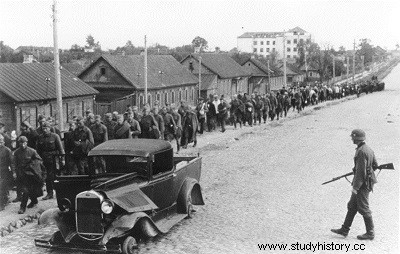
However, it would be a mistake to believe that the German troops had met no resistance and had advanced without a fight. On the contrary, the Soviet troops resisted fiercely, but they had not been able to create a continuous and solid defense front.
The defenders of Libava (Liepaïa), industrial city and military port of Latvia, have for example written a glorious page in the history of war. Units and detachments of hastily armed workers held out for ten days in the city. They stopped the German 291st Infantry Division, supported by units of marines, tanks, artillery and air force, and thwarted the German plan for an offensive along the shore of the Baltic.
The defense of the Brest Fortress (Brest Litovsk), which commanded the route of the Germans' main offensive on Minsk, finally entered into legend. From the second day of the war, the high command of the Wehrmacht (O.K.W.) had announced the capture of Brest; but the garrison, made up of a few disparate units and a detachment of border guards, surrounded in the old citadel, repelled the strong attacks of the 45th German infantry division for a whole month, inflicting heavy losses on it. A life-and-death struggle was waged above and below ground—in the cellars and subterranean galleries of the citadel. The battle did not end until only a small group of wounded officers and soldiers remained who had run out of water, supplies and ammunition.
The defenders of the town of Peremychl (Przemysl), located on the southern flank of the front, west of Lvov, also fought heroically. The enemy had entered the city on June 22, but was chased out the next day by Soviet units, which only evacuated it on June 29, on the orders of the high command, because of the unfavorable situafion that had arisen. on the neighboring sectors of the front.
The Soviet border guards were not unworthy. The Germans had to fight for several days to take certain positions. Vladimir Volynsky, for example, held out for eleven days and only fell into enemy hands when all his defenders had fallen.
Not content to remain on the defensive, Russian troops attacked powerfully. Thus, a great tank battle took place in the Lutsk-Brody-Rovno region, where the command of this sector had mounted a counter-offensive by grouping the forces of four mechanized corps. These units were still equipped with old T-26 and BT-5 tanks and, despite having only a third of their regulatory equipment, delayed the enemy offensive for several days.
Nevertheless, the Wehrmacht continued to advance and was able to quite quickly conquer a huge territory consisting of Latvia, Lithuania, Belarus, a large part of Ukraine and Moldova. Overestimating its successes and underestimating the forces of the Red Army, the German command was sure that victory was near. On July 3, Halder, Chief of the General Staff, wrote in his diary:“...I shall not exaggerate in saying that the Russian campaign was won in fourteen days. »
